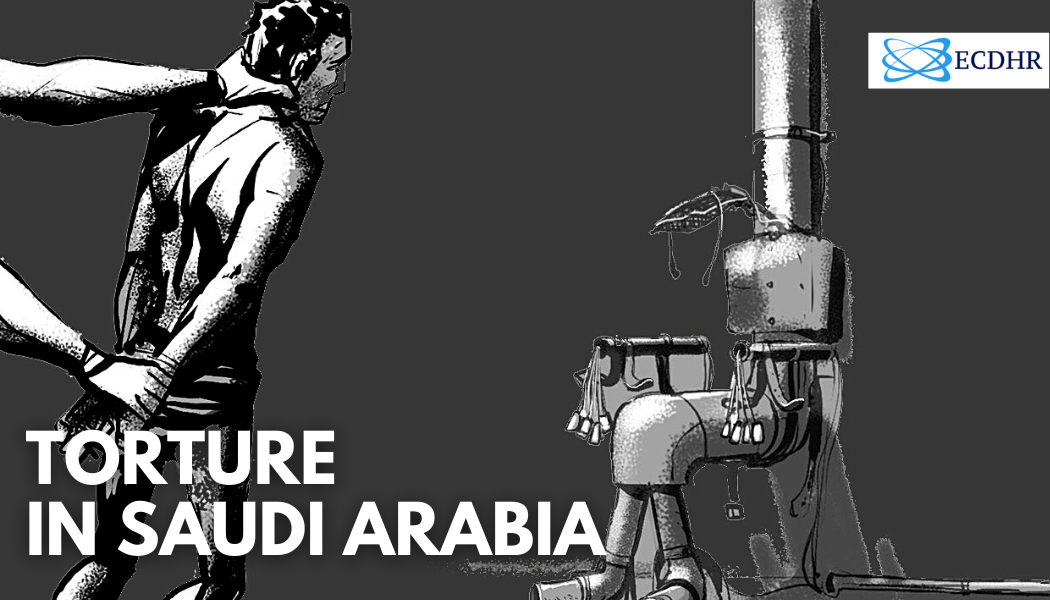To mark the International Day of Victims of Torture, ECDHR presents an article that examines torture in Saudi Arabia. It takes a women’s right approach to this issue and specifically looks at the prevalence of torture for women’s rights defenders as this month Nassima Al Sadah and Maya Al Zharani should be finally released after having spent three years in prison.
Torture in Saudi Arabia is not a rare occurence, it remains deeply entrenched in the criminal system process. During its last concluding recommendations, the Committee against Torture (CAT) recognised that torture and ill-treatment are common practices in prisons and detention centres, in particular the branches of the Criminal Investigation Department of the Ministry of Interior and in Al-Mabahith detention centres. Torture is used as a means to obtain confession which are later relied upon in unfair trials to ensure the conviction of the defendant. In addition, torture and ill treatment may also happen at the hands of the Commission for the Promotion of Virtue and the Prevention of Vice. It must be noted that corporal punishments such as flogging/lashing and amputation of limbs, which have been recognised as amounting to torture and cruel, inhuman and degrading treatment by the CAT, are still imposed by the state authorities as sentences. In this regard, the case of Ra’if Badawi must be remembered as he was sentenced to 1,000 lashes in addition to 10 years in prison for his human rights activism.
For women, the risk of ill-treatment does however not stop there. Domestic violence remains a widespread problem in Saudi Arabia where the male guardianship system renders women extremely vulnerable as they are dependent on their male counterparts. Moreover, many female domestic workers suffer from bad treatment, ranging from physical, psychological to sexual assault. As in other countries in the Gulf Region, the kafala system, a visa- sponsorship system, has been decried as one of the cause of the widespread maltreatment received by migrant workers in general, but also in particular by domestic workers who are predominantly women and are not protected to the same extent by the law.
The continued prevalence of torture in Saudi Arabia can be explained by a number of factors. One of such factors is the deep culture of impunity that prevails in the country for acts of torture, officials are not held accountable for their violations of human rights. Certain mechanisms established for the promotion and protection of Human Rights, such as the Human Rights Commission and the National Society for Human Rights, lack independence from the executive branch and cannot therefore objectively reviewed torture complaints nor fulfil their monitoring role.
Another factor, the national law is not in line with international standards. While Saudi Arabia has ratified the Convention Against Torture in 1997, the Basic Law of Governance does not mention the prohibition against torture. There is no Penal Code in Saudi Arabia either and while the 2013 Code of Criminal Procedure prohibits subjecting a person under arrest to torture and degrading treatment (article 2), it falls short of the definition of torture required by the Convention. The further absence of comprehensive legal safeguards such as a right to timely legal counsel, independent medical assistance and the lack of requirement to be promptly presented in front of a judge contributes to the vulnerability of people in detention and aggravates the risk of torture. Coerced confessions are also considered as admissible evidence in a court of law which directly contravenes article 15 of the Convention against Torture.
In Saudi Arabia, women’s rights defenders have been fighting for their rights, and in particular they have advocated for the abolition of the male guardianship system as well as for the right to drive which was finally announced in September 2017. Ahead of practically lifting the driving ban in June 2018, the government led a massive crackdown on women’s rights defenders and arrested a dozen of them including Loujain al-Hathloul, Samar Badawi and Nassima al-Sadah. While in detention, several women endured torture and sexual harassment including electric shocks, whipping on the thighs, rape and murder threats and forcible hugging and kissing. They were also subjected to solitary confinement for long periods of time, a practice recognised as torture under the UN Mandela Rules. During her hearing in November 2020, Loujain mentioned the psychological torture she went through while detained. The prison authorities tried to exhaust her by waking her up every 2 hours which caused her nightmares and anguish.
Torture and other cruel, and inhuman or degrading treatment is considered as one of the most serious violation of human rights; nevertheless, it remains widespread and systematic in Saudi Arabia. It affects women in different circumstances, while in detention but also as domestic violence or as physical and psychological abuse while working as a domestic worker. The prevalence of torture can be explained by the flawed legislation and the culture of impunity that reigns in the Kingdom. Saudi Arabia needs to change its legislation as well as its practices when it comes to torture, it is not only an international obligation but also a moral imperative.
If you want to learn more about women’s rights defenders in Saudi Arabia, follow us on social media!

